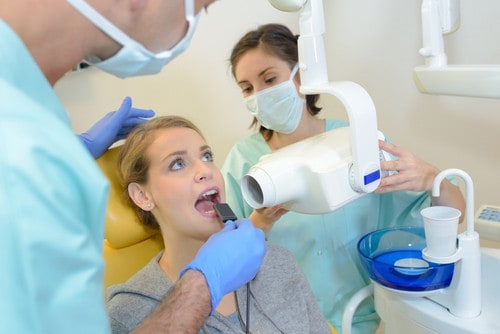There are certain things you expect when you visit your dentist in Doylestown — to get a cleaning, a thorough exam, perhaps a filling or two, and occasionally some x-rays. But are dental x-rays actually necessary? After all, if nothing looks wrong or feels wrong, do you really need to get them? The short answer is yes, and for several reasons.
What Are Dental X-Rays?
Just like an x-ray of your arm or leg, dental x-rays take images that show the hard surfaces in your mouth. The energy of x-rays passes through the skin and highlights only dense areas such as teeth and bone. The skeletal-like images produced from x-rays give your dentist in Doylestown an inside look at your oral health and can help identify problems that can’t be seen through a visual or manual dental exam alone.
What Do Dental X-Rays Show?
We already know that dental x-rays show the teeth and bone, but what does your dentist look for on x-rays? The truth is, x-ray images can identify several things that could otherwise be missed and progress into more serious problems.
- Decay
Dental x-rays are most commonly used to help diagnose decay and cavities when they’re still small and easier to treat. You may not yet even have any signs of a cavity, but a quick x-ray can show one developing. X-rays can also catch decay that can develop under a previous dental restoration such as a crown or a filling. Finding and treating these areas of decay early can save you from ever experiencing the pain that could result if left alone.
- Abscess
When a patient has a toothache, their dentist in Doylestown will most likely start by taking a few x-rays to get a closer look at the area. Oftentimes, a toothache can be a sign of an infection, also known as an abscess. To treat an abscess, your dentist will most likely remove the infected area of the tooth and may choose to cap it with a dental crown. Severe cases may even require an extraction.
- Bone Loss
Our teeth are typically strongly secured into our jaw bone. But things like gum disease, missing teeth, and osteoporosis can cause the jaw bone to deteriorate. This bone loss can increase the risk of tooth loss, cause headaches and jaw pain, and can even affect the appearance of the face making it appear wrinkly or saggy.
Are Dental X-Rays Safe?
We understand that there may be some concerns surrounding the use of dental x-rays and exposure to radiation. However, advancements in dental technology have made digital dental x-rays one of the lowest forms of radiation emission. In fact, research conducted by the Kois Center for Dental Education shows that four bitewing x-rays emit only 0.005 mSv (millisieverts) of radiation. This is less than what humans are exposed to naturally every day.
Even though you may not get dental x-rays at every appointment, you should get them when they are recommended. They will help your dentist provide personalized care, catch and treat problems early, and help you maintain a healthy smile.

